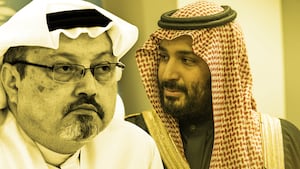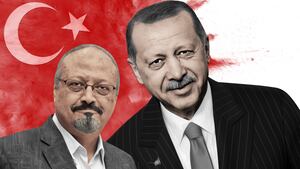ISTANBUL, Turkey—Dissident Saudi journalist Jamal Khashoggi was strangled to death and dismembered immediately after entering the Saudi embassy Oct. 2, Istanbul’s chief public prosecutor said Tuesday in a revelation that cast further doubt on the Saudi government’s explanation of the grisly murder and its commitment to a serious inquiry.
Prosecutor Irfin Fidan laid out Turkey’s version of facts after hosting a fruitless three-day visit by his Saudi counterpart, Saud al-Mojeb, in what had earlier been described as a joint investigation.
But a joint investigation now appears unlikely, for al-Mojeb refused to answer the most critical standing questions: who ordered a Saudi government 15-member hit team to travel to Istanbul, and how they disposed of the Washington Post columnist’s body.
Turkish officials were clearly angered that al-Mojeb’s visit ended with the Saudis leaving such important gaps in the narrative.
“Despite our well-intentioned efforts to reveal the truth, no concrete results have come out of those meetings,” Fidan’s office said in a statement.
The Saudis may be hoping the furor over the Khashoggi murder will die down if they keep stalling, but Bruce Riedel at the Brookings Institution in Washington, D.C., notes that “the more the Saudis try to develop their cover story the more it will unravel further.”
“It’s the murder of the century, so far,” says Riedel.
The Turkish prosecutor in his statement presented the facts of the case as his office sees them.
“In line with plans that were made in advance, the victim, Jamal Khashoggi, was choked to death immediately after entering the Consulate General of Saudi Arabia in Istanbul on Oct. 2, 2018, for marriage formalities. The victim’s body was dismembered and destroyed following his death by suffocation—again in line with advance plans,” the statement said.
In leaks to the media, Turkish officials previously said Khashoggi died of strangulation and his body had been dismembered, but this is the first time they’ve said he was suffocated immediately after entering the Istanbul Consulate, thus refuting earlier Saudi assertions that Khashoggi died by accident.
The Turkish statement put new pressure on the Saudi government and the de facto ruler, Crown Prince Mohammed bin Salman, who is widely suspected of ordering the killing.
The Turkish prosecutor did not disclose how officials here learned the facts, but there’s little doubt based on reports of the content that Turkish intelligence had bugged the Saudi mission.
The Saudi government also backtracked on a Reuters account of a week ago that quoted Saudi officials saying Khashoggi’s body was wrapped in a carpet and handed over to a “local cooperator.” Turkey has asked repeatedly that the Saudis identify that person. Turkish President Recep Tayyip Erdogan made the demand himself in a speech last week.
But in a written message to Fidan’s office, the Saudi prosecutor’s office said that “no statement had been made by the authorities of the Kingdom of Saudi Arabia regarding the existence of a ‘local cooperator.’” Up to now, Saudi officials had not denied the Reuters account.
Fidan’s questions to al-Mojeb tell sketch a straightforward, damning picture of Saudi intransigence.
According to the statement, Turkish officials asked verbally and in writing “(a) where Jamal Khashoggi’s body was, (b) whether the Saudi investigation had discovered anything regarding the planning stage of Khashoggi’s killing, and (c) who the reported ‘local cooperator’ was.”
As al-Mojeb was leaving Istanbul Wednesday he provided a written response which was then released by the Turks. In it he invited the Turkish prosecutor and his delegation to Saudi Arabia “along with the evidence that they have obtained,” the Turkish prosecutor’s office said.
The question of what had happened to Khashoggi’s body and whether the killing was premeditated could only be discovered as a result of a joint investigation with Saudi Arabia, said the Saudi statement. This appeared to be an attempt to put the focus on how Turkey gathered its evidence. Turkey has refused to share the recording with any other country.
Riedel, in Washington, notes that the key witness in the case is Mohammed al-Otaibi, who was consul general at the time of the murder. He allegedly played a key role in the conspiracy when he notified Riyadh that Khashoggi had visited the Istanbul consulate on Sept. 28 to get papers for his marriage, and al-Otaibi was on the scene when the murder and alleged dismemberment took place.
“I know the Saudis aren’t going to produce this guy,” said Riedel, “but he can answer all the questions, and I hope every time the Saudi foreign minister holds a press conference some reporter asks why [al-Otaibi] has not been produced.”
In any case, Riedel does not think the Turks will let this case go. “Humiliating the Saudis must be so satisfying for them,” he said.
With additional reporting by Christopher Dickey in Washington, D.C.






